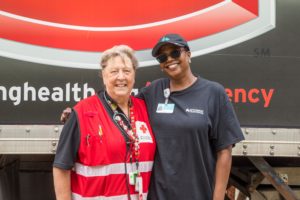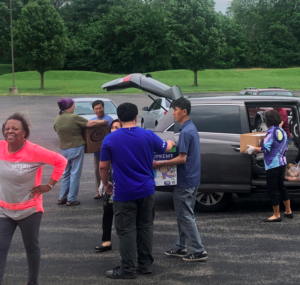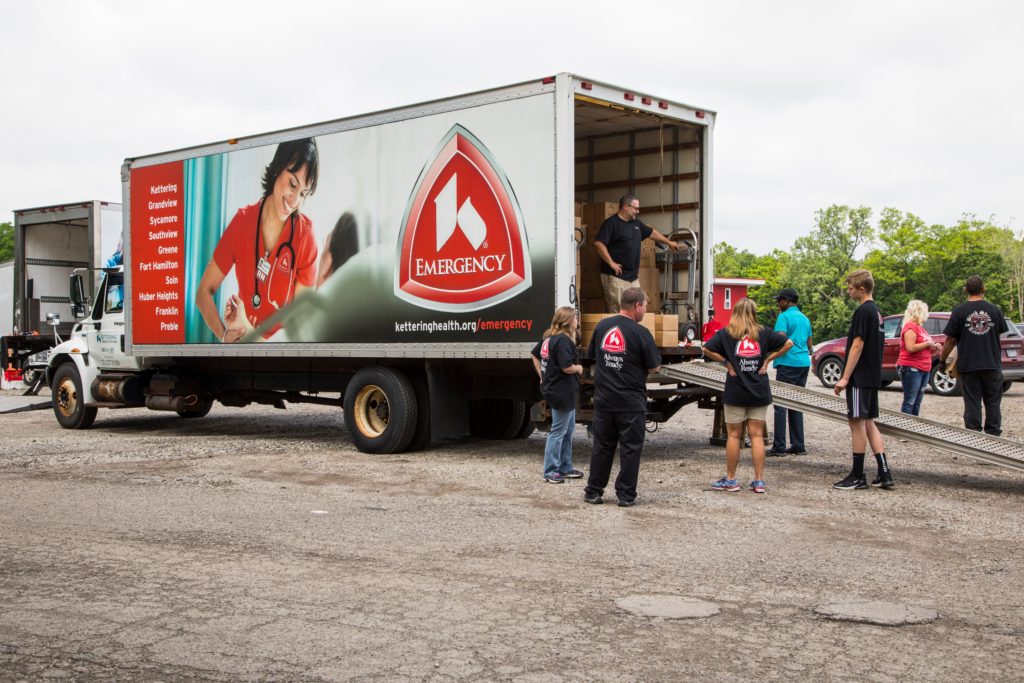By Melanie Raskin
The mission call of home: Dayton, Ohio, takes care of its own
Like a lot of American cities, Dayton, Ohio, has problems that create despair, loneliness and hopelessness. But it is also full of bright and shining people turning good ideas into real solutions that transform despair into support, loneliness into connection and hopelessness into optimism. And it is all because of alignment — knowing the right people with the right resources at the right time, and connecting them in the right way.
Often, the intersection of need and help is Kettering Health Network (KHN). This not-for-profit group of eight hospitals, Kettering College and more than 120 outpatient facilities serving southwest Ohio is the perfect nexus of support, according to Peter Bath, vice president for missions and ministry. In charge of building and nurturing intentional partnerships in the community and an integral part of community efforts and programs,
 Bath believes deep problem-solving requires a broader view. “The real need is to move farther upstream and look at social determinants that drive people to moments of despair, hopelessness, helplessness and lack of community, and address those core needs of housing, food and work,” he says. “These are the true challenges at-risk populations face. Imagine life as a river. Things unaddressed upstream have bad outcomes downstream: lacking food and work manifests in diabetes, high blood pressure and heart disease. We have to address core needs.” Day by day, step by step, Dayton is answering the mission call of home.
Bath believes deep problem-solving requires a broader view. “The real need is to move farther upstream and look at social determinants that drive people to moments of despair, hopelessness, helplessness and lack of community, and address those core needs of housing, food and work,” he says. “These are the true challenges at-risk populations face. Imagine life as a river. Things unaddressed upstream have bad outcomes downstream: lacking food and work manifests in diabetes, high blood pressure and heart disease. We have to address core needs.” Day by day, step by step, Dayton is answering the mission call of home.
Meeting the Opioid Crisis with Care
The opioid crisis in Dayton has decimated families and addicts, but also first responders, who suffer from compassion fatigue and burnout. The community has risen to the challenge and created a number of programs to answer the myriad needs. KHN worked with other health systems and first responders to create OneFifteen, a whole-person addiction and recovery residential program that includes crisis stabilization, social consultation, peer support and vocational training.
Brigid’s Path is Ohio’s first newborn recovery center for babies exposed to or addicted to drugs. With a capacity of 24 babies, the facility has cared for 100 infants since 2017. Mothers in recovery choose to send their newborns suffering withdrawal from addiction straight from the hospital neonatal intensive care unit to Brigid’s Path, instead of into foster care. This 24/7 service offers moms in recovery compassionate support, community connections and resources, and continuing care, standing by mothers on their journey to recovery. It provides babies a healthy start, family care and safety first. In a word, hope.
Creating ‘Home’ for Everyone
As the number of African refugees from Rwanda and Democratic Republic of Congo grows, so does the opportunity to connect and support. Currently, the approximately 300 refugees are being helped by organizations, advocates and volunteers, including KHN, to navigate the Immigration and Naturalization Service (INS), overcome language barriers, find housing and jobs, and access the education system. The African church meets on the campus of Grandview Hospital.
The nonprofit Good Neighbor House (GNH), a collaboration of Dayton-area Seventh-Day Adventist churches, provides food pantry services, clothing and household items to underserved people. The challenge of affordable health care for Dayton’s working uninsured populations expanded the original GNH vision to include additional partners, resulting in a clinic providing a full range of medical, dental and vision services, as well as health education and screenings.
Weathering the Storm
On Memorial Day 2019, 15 tornadoes swept through town, devastating homes and families. For three weeks, KHN and a team of area nonprofit organizations, the Rotary Club and even area banks cooked and delivered meals to people in need. Once again, it was an opportunity to make the area churches the local hubs of engagement and support for local people. Creating a coalition of the faith community and networking area churches and congregations to minister to the spirit, as well as the mind and body, day-to-day and during disasters, are key to a healthy community. “This is what people need,” Bath comments. “To gather and find hope, encouragement, health, education and resources.”
Caring Through COVID
As in countless cities across the nation, COVID-19 is shining a relentless and glaring spotlight on communities, revealing gaping holes in the societal safety net, showing just how gossamer-thin that fabric has been stretched, to the point of nonexistence. Bath and Dayton clergy have been stitching up those rents and tears as quickly as they can. Bath has hosted several Zoom conferences for hundreds of faith leaders to share the facts about the virus, talk through new ways to minister, identify sources of and responses to stress and anxiety, and understand and relieve isolation. For instance, partnering United Way agencies report the challenges of serving people experiencing domestic violence during COVID, since the abused are stuck at home with abusers. Downtown Dayton is one of the largest food deserts east of the Mississippi River. People didn’t realize the importance of the school lunch program until COVID shut it down. “Local therapy is the answer,” Bath says. “The sense of community that has always been there will see us through this. COVID has simply illustrated that we need to be creative and practical with our solutions.”
KHN’s Grandview campus has amped up its internet so the community can come in and use it. And KHN has created respite rooms for hospital staff, filled with donated gifts from churches and neighborhood people and businesses. One florist donated 250 Easter lilies last spring to show support for staff. Churches are leading prayer walks around the hospital, as well as parking lot pray-ins, flashing their car headlights toward the hospital as they pray. “All of these efforts are a message from the city to our staff and patients that we are not alone, we are all here for each other,” Bath says. “Candy bars come and go, but you will never forget a prayer circle that encompasses your entire hospital.”
A Time for Change
Substance abuse or tornadoes, refugee resettlement or COVID, Bath believes it is time to move from mere drive-by concern to in-the-trenches care. “So often driving home at night, we commute through downtown areas of need,” Bath explains. “We don’t linger, taking time to understand and address those needs. I think that’s a checkbox way of looking at life. To incarnate, abide with, dwell within and build those partnerships has been a blessing. Many of my Sundays have been spent attending church downtown in West Dayton. I-75 is the dividing line in our divided city. The west side is challenged, but it doesn’t need to be. Expecting people with need to get on a bus that doesn’t exist to come get services in the suburbs doesn’t work.
Meeting people where they are — moving services and support downtown — does.” Bath is quick to point out that this is not a rescue mission. “These are resourceful people of great wisdom who know exactly what is needed; they just need the tools to meet the challenges. Dayton is stepping forward and helping provide those tools.”
Knowing where to start is often the biggest challenge. A spirit of discovery doesn’t hurt. “As you begin to engage in this work, you find there’s always so much more to do,” he explains. “It’s like an iceberg: We’re only seeing the 10% on the surface and the other 90% is hidden underwater.” But Bath sees problem-solving as a snowball effect: One person brings a skill and invites someone with a different skill to join in, that person invites another, and so on. “We know people have an innate desire to help make a difference,” he points out. “They just need an invitation. Coordination is crucial. You have to know the core vision and mission of potential partners and agencies, and then you have to invite them to the table.
 The Greater Dayton United Way’s 211 information service has been instrumental in our efforts. They’ve done a remarkable job. When we sit down and do an inventory of the extensive assets around us — food, housing, health care, work opportunities, social programs — we see that many of these problems exist because we are not connecting people with needs to people with resources.” To Bath, alignment creates sustainability. “If it’s one person doing the work, it’s good as long as that person has energy and resources. If it’s us doing the work, we can create a lifetime of empowerment and change. The call is to build bridges and create the space for folks to step in.”
The Greater Dayton United Way’s 211 information service has been instrumental in our efforts. They’ve done a remarkable job. When we sit down and do an inventory of the extensive assets around us — food, housing, health care, work opportunities, social programs — we see that many of these problems exist because we are not connecting people with needs to people with resources.” To Bath, alignment creates sustainability. “If it’s one person doing the work, it’s good as long as that person has energy and resources. If it’s us doing the work, we can create a lifetime of empowerment and change. The call is to build bridges and create the space for folks to step in.”
Bath dreams of a day when suburban churches partner with downtown churches for real change. “Mission work isn’t always international,” he says. “It’s right here in our own backyard.” Kettering Health Network’s nine campuses are intentionally reaching out to local clergy and providing first responder education so pastors have a better understanding of what’s confronting their communities and to gain confidence in the strength of their health care outreach. Bath believes these downtown churches can become the center of local information and resources in their neighborhoods, a place where neighbors can experience health care, worship and community.
Another dream is to harness the democratizing power of technology; if you have a phone, you can get support. “My vision is for our devices to geolocate us, and when we push a button, ‘I need food,’ ‘I need a dentist,’ ‘I need a job,’ an inventory scrolls a list of resources near us,” he says. “We have to look to technology to be the bridge that links us to the people and resources that can help. Then we need a supporter, a friend, someone who can help the refugee, the marginalized person, the underserved and uninsured worker navigate health care, food deserts, language barriers and employment opportunities. The goal is to create that same safety network that’s here for the rest of us for them.”
Dayton, Ohio is a city divided. Add to that the recent tsunami of trouble, from the devastation of families living the opioid crisis that confronts most American cities, to the destruction that came from a swath of deadly tornadoes that ravaged neighborhoods, to the social, health and economic impacts of COVID. But this city discovered divides were made to be bridged, chasms were made to be crossed and separation was made to be knitted together again. They learned success hinged on the alignment of assets — bringing together disparate people in one cause: the healing of whatever is happening to them and through them, as a community, for the community.
“The whole point is to be with each other, to walk together, not just pass through, drive by or write a check,” Bath concludes. “It’s being a friend, sitting down and helping people plan the practical stuff. Love shows up and says, ‘Let me make dinner for you, let’s do a healing service after nine people are shot and killed downtown.’ We are our neighbor’s keeper, and we need each other. In Dayton, we don’t do things to or for someone. We do things with each other.” And that makes all the difference.

